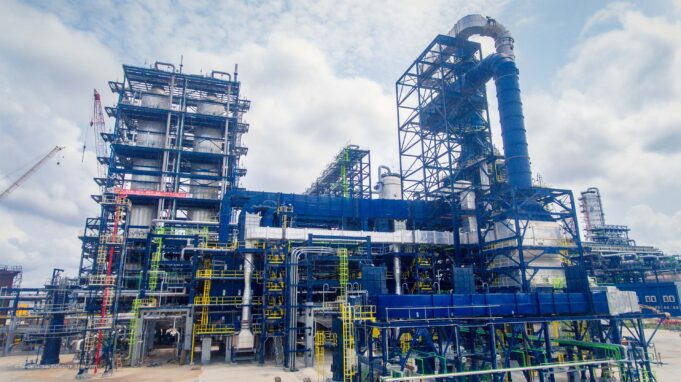Dangote Petroleum Refinery recently exported two jet fuel cargoes to Saudi Aramco, the world’s largest oil producer and a leading integrated oil and gas company globally, in Saudi Arabia.
Saudi Aramco is the official Saudi Arabian oil company, which is a majority state-owned petroleum and natural gas company that is the national oil company of Saudi Arabia.
The President of Dangote Group, Aliko Dangote, revealed this during a visit by the Nigerian Economic Summit Group (NESG) team to both Dangote Fertiliser Limited and the Dangote Petroleum Refinery and Petrochemicals in the Ibeju Lekki area of Lagos State on Tuesday, February 4, 2025.
Dangote said exporting products to the global markets, especially Saudi Aramco, was because of his refinery’s world-class standards and advanced technologies.
“We are reaching the ambitious goals we set for ourselves, and I’m pleased to announce that we’ve just sold two cargoes of jet fuel to Saudi Aramco,” Dangote was quoted as saying in a statement issued by the refinery on Wednesday, February 5.
Since its production began in 2024, the Dangote refinery has steadily increased its output, now reaching 550,000 barrels per day.
While commending Aliko Dangote for establishing the $20 billion refinery – the largest single-train refinery in the world – the NESG Chairman, Niyi Yusuf, stated that Nigeria needs more investments of this calibre to reach its $1 trillion economy goal.
Yusuf said: “To achieve a $1 trillion economy, much of that must come from domestic investments. I joked during the bus ride that while others are dredging to create islands for leisure, you’ve dredged 65 million cubic tonnes of sand to create a future for the country.
“This refinery, fertiliser plant, petrochemical complex, and supporting infrastructure are monumental.
“My hope is that God grants you the strength, courage, and health to realise your ambitions and that in your lifetime, a new Nigeria will emerge.”
Dangote Refinery crashes ex-depot price of petrol to N890
Yusuf stressed that such local industries are essential to Nigeria’s industrialisation and will help foster the growth of Small and Medium Enterprises (SMEs).
He added that the NESG would continue to advocate for an improved investment climate to attract entrepreneurs, boost development, ensure food security, and address insecurity.
He, however, lamented that Nigeria has become a dumping ground for foreign products and stressed that the country must support its entrepreneurs to become a global player.
“It’s inconceivable that a nation of over 230 million people, with an annual birth rate higher than the total population of some countries, is still dependent on imports to feed its citizens,” the NESG chairman stated.
Dangote, in his response, reiterated the importance of the private sector in national development, saying Nigeria’s challenges could largely be overcome by providing gainful employment to the people.
Dangote also cited the example of the Benin Republic, where cement imports are restricted as part of a deliberate strategy to protect local industries, despite the proximity of his Ibese plant.
“The president is a personal friend, and my Ibese plant is just 28km from Benin, yet they refuse to allow imports to protect their local industries, most of which are grinding plants,” he said.
He further emphasised that the government stands to gain substantially when the private sector flourishes, noting that 52 kobo (52%) of every naira Dangote Cement generates goes to the government.
- Gabon’s military leader, Brice Nguema, wins presidential election - April 13, 2025
- Tinubu flags off Abuja-Kaduna road reconstruction - April 13, 2025
- Otedola: I supported Christian Chukwu’s treatment for cancer in UK - April 13, 2025








